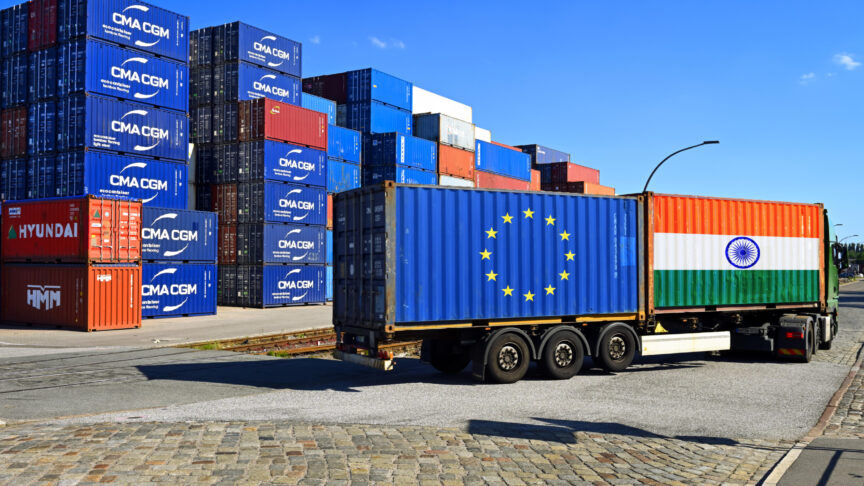Kaczynski’s folly: Time for Europeans to speak out
European leaders and public authorities should call upon the government in Warsaw to postpone the presidential election on May 10.
If Hungary has become the European Union’s first coronavirus autocracy, Poland looks set to be the second. The Polish government’s plan to hold a presidential election on 10 May makes a mockery of democracy and poses a massive risk to millions of people. If it goes ahead, the election will deal the final blow to democracy in Poland and throw the country into a political crisis of unprecedented proportions. Yet it is not too late to stop this folly – and Europe must not remain silent.
The May election has long been hailed as the make-or-break moment for Poland. Since 2015, the government has transformed the country into an illiberal democracy. It has done so with the support of the nominally independent president, Andrzej Duda – nicknamed ‘Kaczynski’s pen’ for his habit of signing off on all proposals made by Jaroslaw Kaczynski’s ruling Law and Justice party (PiS). As such, the election of a president drawn from ranks of the opposition would be a game-changer, as he or she could veto PiS legislation. This is why the government is so determined to hold the vote on schedule, despite the rising number of coronavirus infections and deaths in Poland – which threaten to overwhelm the country’s poorly equipped healthcare system. The government’s goal is to seal Duda’s likely victory before it is too late. If the vote is postponed, a virus-induced economic crisis is likely to generate resentment of the ruling party and significantly reduce his chances of re-election.
Nonetheless, the vote cannot take place without risking people’s lives. Around 50 percent of Poland’s 30 million voters turned out in the last presidential election, held in 2015. In a speech in parliament last Monday, Prime Minister Mateusz Morawiecki admitted that the peak of the infections in Poland would come in May or June. But, even if the pandemic miraculously fades away in the next five weeks, the severe health risks of a communal exercise on this scale will not.
To conduct the election as scheduled, the Polish authorities must begin preparations for it now. They need to appoint and train around 250,000 members of electoral committees. The local authorities are obliged by law to organise the election, but they could prove unable or unwilling to do so if this would threaten the lives of citizens. On 6 April, parliament revised the electoral law: the authorities will conduct the entire election via postal voting. However, even this precaution will not remove the serious health risk. The electoral committees will have to be in place to count the votes, while 25,000 postal workers will have to deliver and pick up the ballots. This will create millions of new points of contact between people, likely spreading the virus at a time when its suppression will still be of the utmost importance.
The election raises severe concerns about fundamental democratic standards
The election also raises severe concerns about fundamental democratic standards. Most importantly, electoral campaigns cannot take place as normal while public gatherings are prohibited. And the situation favours the incumbent, who presents himself as an energetic crisis manager. Moreover, the constitution prohibits changes to electoral law in the six months leading up to an election. Poles have little experience with postal voting, as only disabled people were permitted to use this method in previous elections. The law on universal postal voting will enter into force on 7 May at the earliest, after having gone through the standard parliamentary procedure. It is administratively impossible to organise elections within three days without a profound risk of electoral fraud.
There is a straightforward way to respect both democratic standards and people’s lives. The government could declare a natural disaster under which elections cannot take place. This state would initially last for one month but, with the consent of parliament, the government could extend it for as long as the situation required. If the pandemic receded, the authorities could hold the election in a few months time. With the closure of schools and restaurants, widespread bankruptcies, enforced social distancing, and large fines those who gather in groups, the state of emergency is already a fact of life. All opposition parties and presidential candidates – from the left to the far right – have called upon the government to formalise this. But Kaczynski remains determined to seize the opportunity to consolidate his power.
Governments across Europe have generated concern by introducing restrictions and other emergency measures to fight the pandemic. Indeed, special executive powers can be dangerous if they remain in place permanently. But countries with stable democratic institutions and independent judiciaries are likely to contain this threat to the liberal order. By contrast, in Poland (and Hungary), where the government has already removed key pillars of the liberal democratic order, the stakes of coronavirus politics are higher than they are elsewhere. There, the battle is not about the scope of civil rights but the future of democracy at a deeper level.
This is not the moment for Europe to be silent. International organisations have to face up to their responsibilities. For instance, the World Health Organisation should issue a warning that elections held in the middle of the pandemic pose a risk to public health. The Council of Europe, which is monitoring the situation in Poland, should issue a clear signal that an election under current conditions would not conform to democratic standards. Neither the council’s representatives nor observers from the Organisation for Security and Co-operation in Europe can travel to Poland to monitor the election. At the EU level, there needs to be more than just expressions of concerns from the European Commission. The president of the European Council should urgently put the situation in Poland and Hungary – both of which are already subject to the Article 7 procedure – on the agenda of its leaders’ next videoconference.
Finally, European leaders and public authorities should openly call upon the government in Warsaw to postpone the election using the instruments provided by the Polish constitution. Sticking to the current schedule is not only undemocratic but also immoral. The fight against the pandemic is a common European responsibility. The PiS government is not only risking the lives of Polish citizens but undermining efforts undertaken by the EU as a whole. If Duda is re-elected on 10 May, he will become a ‘corona president’ – no one should shake his hand.
This article was also published in La Vanguardia (Spain), Le Monde (France), ZeitOnline (Germany), Hospodarske noviny (Czech Republic), Romania Libera (Romania) and Euronews.
The European Council on Foreign Relations does not take collective positions. ECFR publications only represent the views of their individual authors.


